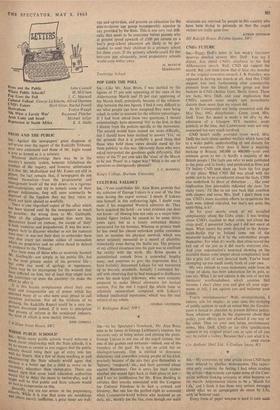Press and the Public Whose Public Schools?
Pop Goes the Poll J. C. Maxwell Cultural Fallout George Lichtheim, Alfred Sherman CND's Future Herb Greer, Rachel Powell
Oh What a Lovely War' Arab. Unity and Israel Repression in South Africa John Connell M. McCruin Derivations Evelyn Waugh Raymond Fletcher Michael Selzer E. S. Sachs PRESS AND THE PUBLIC
SIR,--Against the newspapers' great diapason of self-praise over the report of the Radcliffe Tribunal, your own .comments and those of Mr. Inglis sound a note as honest as it is salutary. Whatever shortcomings there may be in the country's' security system, however infelicitous the conduct of the inquiry, and however unfortunate it is that Mr. Mulholland and Mr. Foster are still in prison, the fact remains that, if newspapers do not submit themselves—from the proprietorial and Management levels all the way down—to a rigorous self-examination, and try to remedy some of their grosser deficiencies, they will soon summarily be deprived of the freedom they say they value so much and have almsed so woefully,. There is'one important aspect of the affair which has been slurred over by the newspapers as much- as possible: the wrong done to Mr. Galbraith. Since all the allegations against him were lies, speculation based on rumour, the excuse of 'duty' is both nauseous and preposterous. It was the news- Papers' duty to discover whether or not the rumours were truer it was not their duty to embroider them into that crazy yet sinister edifice of insinuation which no proprietor and no editor dared to defend in evidence to the Tribunal. For from none of those who so wantonly harmed Mr. Gailbraith—not simply in his public life, but in the most private sector of his personal life- ,ha,s come one word of apology or repentance.
h ave may be no recompense for the wounds they nave inflicted on him, but at least they might have the contrition—or even the courtesy—to make the effort to offer it. • It is this brazen complacency about their own cruel and irresponsible use of power which has sickened many of us who were once proud to call ourselves journalists. For all the mildness of its Phrasing, the Radcliffe Report could be a very .im- portant document indeed, if it were to precipitate
that- process of reform in the newspaper industry, the need of which is now starkly obvious.






































 Previous page
Previous page